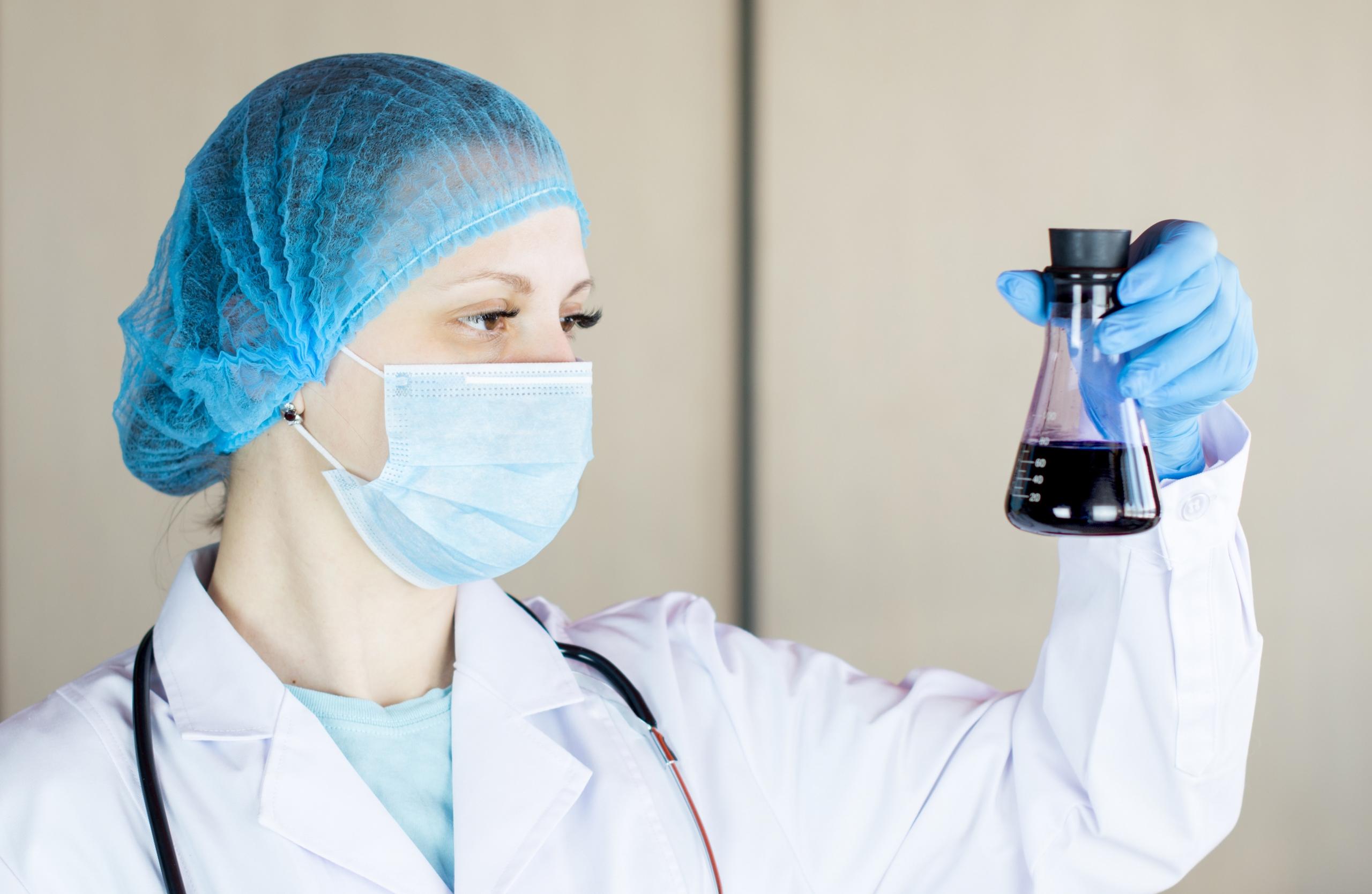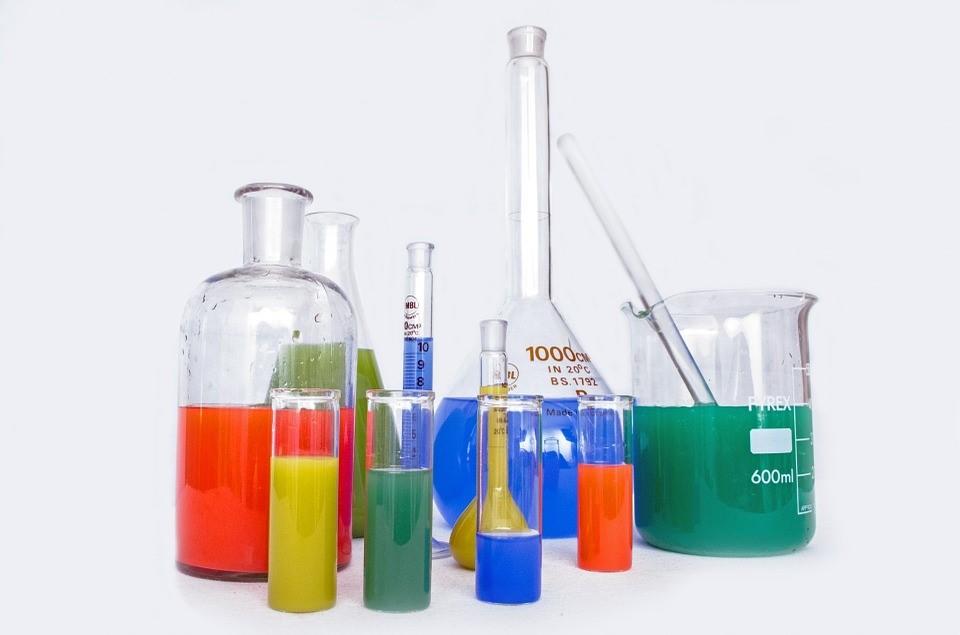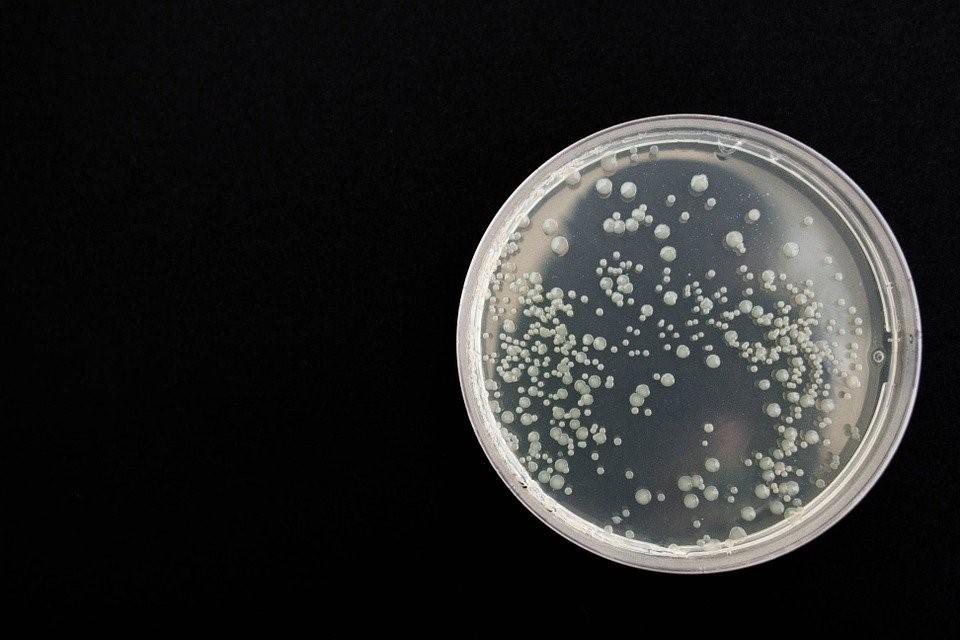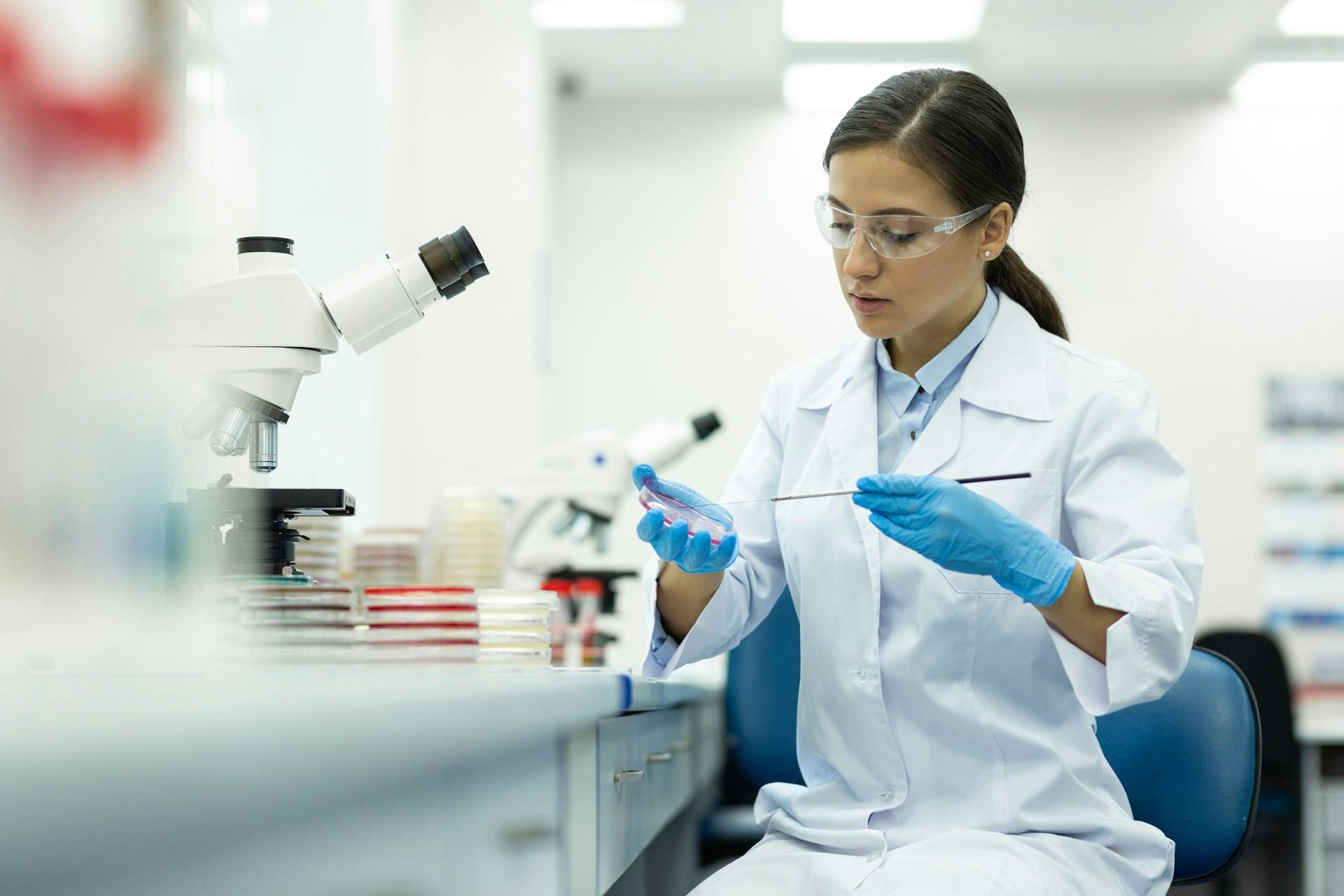Microbiologists contribute to making a more considerable difference in our lives.
They ensure the food and things we use are safe, studying the microbes to track their effectiveness in health or climate change, developing innovative green technologies to minimize the human impact on the natural environment.
Students who pursue a degree in microbiology acquire a firm grasp on high school biology. They aim to answer the crucial global questions by studying and analyzing the microbes.
Microbiologists possess strong emotional stability and great aptitude in academics.
The study to become a microbiologist includes studying the growth, structure, and characteristics of microscopic organisms such as; bacteria, viruses, fungi, etc.
A microbiologist has a keen interest in studying natural phenomena with a highly inquiring mind and strong aptitude in biology 101.
As a microbiologist, one must be manually expert to practice specialized equipment and perform experiments.

How To Become A Microbiologist in America
Studying high school biology, chemistry, physics, and mathematics coursework is ideal for building a solid educational foundation to become a microbiologist.
These courses will give you helpful insight and a better understanding of scientific principles and introduce you to manual microbial methods and equipment used in the laboratory.
To become a microbiologist, a student must complete a bachelor's degree in microbiology or give a science-focused exam in relative fields such as; cell-biology, immunology, parasitology, or biotechnology.
Their coursework provides substantial knowledge of microbiology.
You can even complete a bachelor's degree in microbiology online. The online courses extensively explain microbial physiology, genetics, virology, and microorganisms.
Students can also benefit from taking courses in other areas of science, such as; physics, biochemistry, computer science, and biology.
Suppose someone pursues a degree in microbiology online. In that case, the student would need to work in a laboratory environment to gain additional knowledge and understanding of the microorganisms and topics.
After graduating with a microbiology degree, students should opt for a Ph.D. to conduct independent research in educational firms.
Students who have completed an online biology degree usually specialize in a subfield, such as biochemistry, microbiology, immunology, etc.
However, Ph.D. programs in microbiology include coursework, experiments, laboratory research, and thesis or dissertation.
You can find a biology tutor online here.
Where Can Microbiologists Work in the US?
The career path for a microbiologist depends on the level of education and training.
A bachelor's degree in microbiology helps students qualify for many research, clinical, and technical positions.
As a research or clinical associate, one might provide technical assistance to scientists or directors working in the medical, government, industrial, or educational field.
Achieving flying numbers in the AP biology exam can set a strong foundation for an individual looking to pursue a career in environmental or food microbiology.
The chart below shows how many people with a microbiology degree pursue various roles
| Job Role | Demand |
|---|---|
| Laboratory Technician | 12% |
| Biochemist or Biomedical Scientist | 11% |
| Biological Scientist | 6% |
| Secondary-Level Teacher | 3% |
| Environmental or Social Science Profession | 3% |
As a microbiologist in these fields, one may be responsible for vaccines' quality assurance and safety, antibiotics, vitamins, and antiseptics.
You can learn about how to search for the best biology tutor here.

They are also responsible for identifying harmful and useful microorganisms in food, water, dairy, and pharmaceutical products.
Let's look at individuals' career paths with a bachelor's in microbiology.
| Destination | Percentage |
|---|---|
| Employed | 53.8% |
| Further study – such as; Masters or Ph.D. | 24.5% |
| Working | 10.8% |
| Unemployed | 6.9% |
| Switched | 4% |

Salary Expectations As A Microbiologist In the US
There's no doubt that money is a motivational factor for everyone. We all invest our time and efforts to make a handsome amount of cash to lead a good life.
Anyone would go to extraordinary lengths to make money and enhance their professional lives. However, studying microbiology in the United States has its pros and cons.
If you're someone who is in search of a rip-roaring yet reliable career to aid in settling your life, pursuing a degree in microbiology online is the way to go.
Following that, giving online microbiology lessons to science students is a fruitful method to help them enhance their academic portfolios.
If you have accurate and complete knowledge and substantial experience and expertise in high school biology, you can succeed in microbiology.
Though it sounds boring, the scope of microbiology is one of the most important and lucrative sub-sectors of biology 101.
Therefore, you can have great chances to build and maintain a prosperous life by providing biology homework help.
A professional microbiologist can help you acquire the accurate techniques and discipline to understand the role of microorganisms and their effect on human life.
How Much Can Microbiologists Earn Depending On Their Career Level?
| Career Level | Annual Salary | Pay per hour |
|---|---|---|
| Top-level | $120,736 | $58.05 |
| Senior-level | $92,896 | $44.66 |
| Mid-level | $69,425 | $33.38 |
| Junior-level | $51,884 | $24.94 |
| Entry-level | $39,921 | $19.19 |

Highest Paid Job Roles Of Microbiologists
A microbiologist goes through a ton of preparation to get to a high level. Let's see some of the highest paid jobs in this industry:
1. Top-Level Roles For Microbiologists
The requirement to start a professional career in microbiology depends on the position you want to apply for.
Many high-level clinical microbiology jobs demand candidates who possess postgraduate degrees such as; master's, doctorate, or Ph.D.
Individuals with these degrees are proficient in training mid and entry-level people to design, understand, and implement microbial research studies.
Individuals with these degrees can easily qualify for senior-level positions that commonly involve experimental methods and independent research.
The chart below demonstrates which senior-level job roles offer handsome pay.
| Job Title | Annual Salary | Weekly Pay |
|---|---|---|
| Vice President Microbiologist | $136, 339 | $2,622 |
| Director of Clinical Microbiology | $124,556 | $2,395 |
| Microbiology Manager | $103,124 | $1,983 |
| Senior Microbiology Scientist | $99,412 | $1,912 |
2. Senior-Level Roles For Microbiologists
As a senior microbiologist, one specializes in performing and conducting research focused on microbial science, microorganisms, immunology, biodegradation, climate change, epidemiology, food spoilage, and biotechnology.
A Senior-level microbiologist is a professional qualified to deliver microbiology online courses and lessons.
The role as a lecturer or professor at higher secondary or advanced education sector teaches with a particular emphasis on clinical microbiology, including cell biology, molecular study, and virology.
As a lecturer, you will prepare and deliver practical classes, research supervision, lectures, student reports and set customized lessons for high school biology to understand better.
As a senior-level microbiology professional, you can even act as a mentor or consultant to the mid-level people to help them reach their scientific goals.
You can also work as a laboratory director at the research facility.
The director's responsibilities include overseeing operations of private research firms, developing a curriculum for high school biology, consulting senior pharmacists and researchers to determine the best direction for future research studies.
Moreover, when it comes to senior-level employment, people may work for private laboratories, government agencies, and teach and colleges or universities.
| Job Title | Annual Salary | Monthly Pay |
|---|---|---|
| Laboratory Director | $106,752 | $24,635 |
| Research Scientist | $104,038 | $24,008 |
| Lecturer or Professor | $72,787 | $16,797 |
| Public Health Analyst | $68,479 | $15,802 |
3. Mid-Level Roles For Microbiologists
As a person at mid-level in the microbiology field, one can plan and conduct complicated research studies and virology projects, such as; developing techniques to improve sterilization procedures and studying new drugs to combat infectious diseases more effectively.
If you plan on pursuing a career around this field, becoming a principal or college professor to conduct in-person or microbiology online lessons.
As a mid-level microbiologist, you can qualify as an expert in high school biology to train the students to conduct research at an academic level.
You can even achieve a mid-level position in various industries, including academic institutions, private laboratories, research firms, government medical agencies, or any non-profit healthcare organization.
| Job Title | Annual Salary | Monthly Pay |
|---|---|---|
| Health Consultant | $64,089 | $14,789 |
| Principal Investigator | $56,572 | $13,055 |
| College Professor | $55,287 | $12,758 |
4. Junior-Level Roles For Microbiologists
Being a junior-level in microbiology offers ample room for knowledge and learning.
Significant responsibilities of being a junior-level microbiologist include; performing diagnostic molecular assays, overlooking quality control, and quality assurance.
You can earn a professional degree through online microbiology courses, which can assist you in becoming a laboratory technician.
You will be trained to conduct tests on living organisms, including human-animal, and perform environmental monitoring to concise, accurate testing results.
With a deep understanding and knowledge of biology 101, a person can pursue their career becoming an academic writer.
An academic writer will compose articles and other content pieces for educational books, magazines, publications, technical manuals, and scripts.
Clinical microbiologists or laboratory technicians can utilize their expertise and knowledge to curate accurate and informative content to provide biology homework help.
| Job Title | Annual Salary | Monthly Salary |
|---|---|---|
| Academic Writer | $57,465 | $12,561 |
| Research Technologist | $53,264 | $12,291 |
| Laboratory Technician | $50,279 | $11,602 |
5. Entry-Level Roles For Microbiologists
Some entry-level positions in the microbiology field may not require an advanced degree.
For instance, you can easily be hired as a research associate or technician with bachelor's degrees or professional completion of the AP biology exam.
As an entry-level graduate, a person is qualified to perform a variety of methods, including; testing microorganisms, collecting data, writing down results, and analyzing procedures.
The core responsibility of an entry-level technician is to identify harmful contaminants and conduct studies on microorganisms.
Another responsibility includes keeping a record of the data and communicating the potential hazards and improvements to the supervisor.
| Job Title | Annual Salary | Monthly Pay |
|---|---|---|
| Research Associate | $46,340 | $10,693 |
| Quality Technician | $40,321 | $9,304 |

Ready To Increase Your Employment Desirability?
Not every industry demands continued education to enhance your career path. Moreover, earning a degree in microbiology can help you quickly advance your career to high-earning positions.
As microbiology applies to so many areas of different fields, training in this discipline through high school biology can potentially open up doors to successful career possibilities.
Superprof offers a wide range of professional tutors who possess substantial expertise in microbiology and science. You can enroll yourself and learn microbiology online.
Summarize with AI:















